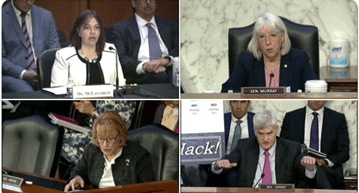CoSN Advocacy and Policy Impacts
CoSN is a strong presence and voice in the policy debates at the national and state level serving as a champion of policies required to power next-generation learning environments. Our policy agenda focuses on securing robust funding for edtech, strengthening the E-Rate program, protecting the privacy and security of student data and promoting digital equity. We provide our members with the tools and resources to be successful advocates on these issues.
Policy actions are categorized based on CoSN’s focus on four key policy issues: E-Rate and Broadband Access in Classrooms, EdTech Funding, Privacy and Data Security, and Digital Equity.
E-Rate
New Release! A Statement from the Consortium for School Networking (CoSN); State E-rate Coordinators Alliance (SECA); State Educational Technology Directors Association (SETDA); and Schools, Health & Libraries Broadband (SHLB) Coalition on the recent cyber-attack on the Los Angeles Unified School District.
Cybersecurity
Wednesday, May 18, 2022 was a milestone day for CoSN. Our cybersecurity subject matter expert, Amy McLaughlin, CETL, testified before the U.S. Senate Committee for Health Education Labor and Pensions (HELP). Amy’s testimony was on K-12 cybersecurity and the hearing had other experts on higher ed, health care and overall cybersecurity threats.
“We have a huge shortage in this area (of cybersecurity workforce)…Ms. McLaughlin, what can we do to encourage our younger kids (to consider a career in cybersecurity) and what kind of programs can we put in elementary schools to enhance young people to really get involved. They are really into video games, but that is totally different. What is something that we can get them involved in?” – Sen. Tuberville
“There are all kinds of opportunities to bring students in early. This becomes part of creating a culture of cybersecurity and cyber-safety in schools. We don’t necessarily train students like we do for other safety issues early on, look both ways before crossing the street, etc., but those kind of integrated messages about cyber safety need to be built into the messaging that students get. On top of that, we have opportunities to build a pipeline of students who want to grow into these kind of professions later on, like providing instruction on how to operate cybersecurity cameras, etc.” – Amy McLaughlin
Digital Equity
Student Data Privacy
Ed-Tech Funding
Other


